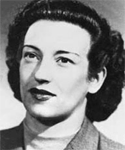Agnes Keleti
(1921 - 2025)

Agnes Keleti is a Hungarian-born Israeli gymnast and the second most successful Jewish Olympian in history, winner of 11 medals including five gold, four silver, and two bronze, member of the International Gymnastics Hall of Fame and the Hungarian Sports Hall of Fame.
Keleti began to study gymnastics at the age of four in Budapest, winning her first national title at 16, the first of 10 national titles in her career. She began focusing on the 1940 Olympics, but World War II caused the cancellation of the Games. At the beginning of the war Keleti’s father was sent to Auschwitz, while her mother and sister were saved by Swedish diplomat Raoul Wallenberg . Keleti purchased the papers of a Christian girl and escaped to a small Hungarian village, where she worked as a maid. After the war, she learned that her mother and sister had survived the concentration camps, but that her father and all her other relatives had been murdered at Auschwitz.
Keleti made the 1948 Hungarian gymnastic team, but an injury caused her to miss Olympic competition. She was nonetheless awarded a silver medal when Hungary finished second in team competition. At the 1952 Helsinki Olympics, Keleti – by now an “old” 31 – won a gold medal in the Floor Exercises, silver in the Combined Team competition, and a bronze in both Team Hand Apparatus and Uneven Parallel Bars. She also finished fourth in the Balance Beam, and sixth in the Individual All-Around.
In 1954, Keleti captured the World Championship in Uneven Bars, and her Hungarian team won the silver medal in Team Exercises (portable apparatus). She also took the bronze medal in the Balance Beam, and finished fourth in the Floor Exercise. Keleti won the All-Around Hungarian Championships 10 straight times from 1947 to 1956.
At the 1956 Melbourne Olympics, Keleti – now at the advanced age of 35 – won gold medals in the Free-Standing Exercise, Balance Beam, Parallel Bars, and Team Combined Exercise (portable apparatus), and silver medals in the individual all-around and team all-around competitions.
Four weeks before the opening of the Games the Hungarian Revolution began, with the Soviet Union sending troops into Hungary to quash a revolution aimed at ending the country’s Communist domination. Two weeks after the revolt, Keleti and the rest of the Hungarian team left for the Melbourne Olympics and, once there, Keleti refused to return home, defecting to the West. She was able to get her mother and sister out of Hungary, and in 1957 they settled in Israel, where Keleti became an instructor in physical education at the Wingate Institute, where she developed a number of national gymnastic teams.
Keleti’s total of 10 Olympic medals ranks third all-time among women athletes, and her five gold medals rank fourth all-time for individual winner of Olympic gold medals. Keleti was inducted into the Hungarian Sports Hall of Fame in 1991 and the International Gymnastics Hall of Fame in 2002.
Keleti was the oldest living Olympic medal winner when she died at the age of 103 on January 2, 2025. The Olympic Committee of Israel mourned the loss of “the greatest Jewish athlete of all time.” She “was one of the founders of artistic gymnastics in Israel, raised generations of coaches and athletes and was an icon for excellence who inspired many in Israeli sports.”
Sources: Encyclopaedia Judaica. © 2008 The Gale Group. All Rights Reserved.
“Agnes Keleti, Holocaust survivor and oldest living Olympic medalist, dies at 103,” Times of Israel, (January 2, 2025).


